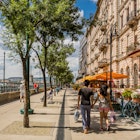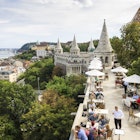

From sightseeing on public transportation to finding a low-cost lunch, these top tips for touring Budapest can help you visit on a budget © Jane Biriukova / Shutterstock
One of the biggest reasons that travelers love Budapest is its reputation as a budget-friendly place to visit. Although it has become more expensive over the years, many visitors still find it’s still cheaper than other European capitals.
Here are some top tips to make your money stretch further in Budapest.
Budget airlines fly into Budapest’s main airport
Unlike many major cities in Europe that have separate far-flung airports for low-cost airlines, Budapest has only one airport. Whether you fly in on a flagship airline or on a low-cost carrier, you’ll arrive at the same place. Low-cost airline Wizz Air is a Hungarian company based at Budapest airport.

Take public transport from the airport to central Budapest
Budapest’s airport is technically in the city but it’s far from the center, so you’ll need to get a transfer into town. Fortunately, there’s inexpensive public transport to get you to where you want to go. A one-way ticket for bus 100E to the city costs 900 Ft (about US$3) and will take you to Deák Ferenc tér, where metro lines 1, 2 and 3 congregate, or you can get off at Kalvin tér for metro line 4. Both stops put you in the heart of downtown Pest.
Central Budapest has lots of hostels
Budapest has plenty of great hostels, making a dorm or an inexpensive private room in the city center an easy find. Dorms can cost as low as 3000 Ft (US$8) a night, but if you’re planning on getting a good night’s sleep, avoid the ones marketed as “party hostels.”
Stay with locals: couch surf or find a homestay
To have a more personal – and less expensive – experience of Budapest, opt for a homestay or a private room instead of renting out a whole apartment or getting a hotel room. You can find rooms on Airbnb with local hosts (check the ratings and reviews carefully) and homestays on Homestay.com and sometimes on Booking.com. Couch surfing is another option. In the Budapest “Official” Couchsurfing group, you can ask for hosting or advice from local group members.
Forget a tour bus: see the city from public transportation
Want to go on a sightseeing bus tour for a fraction of the price? Just hop on Budapest’s public transport. Tram line 2 running north to south along the Danube is one of Europe's most beautiful tram routes, and you’ll see the riverbanks of the Danube along the Pest side with stunning views of Castle Hill and the Hungarian Parliament along the way.
If you want to go to the riverbanks of the Danube on the Buda side, take trams 19 or 41. You can also ride up Andrássy Avenue – a UNESCO-listed boulevard – above ground on bus 105, which will take you up to Heroes’ Square and back along the Danube. A single bus ticket costs just 350 Ft (about US$1).

Cruise the Danube on public transport in summer
If you come to Budapest in the summer, you must sail the Danube. Budapest’s most famous sites – including Buda Castle, Hungarian Parliament and the bridges, to name a few – are best seen from the water. But you don’t need to book a pricey Danube cruise: just get the boat operated by BKK, Budapest’s local transport authority. A trip on one of these boats costs 750 Ft. Boat services operate in summer only, so check on the BKK website for departure times.
Pick the less-touristy, no-frills thermal baths
Budapest is famous for its historic thermal baths, but if you don’t want to pay the relatively high entry, try the lesser-known bathhouses. The Dandár Baths in the XI District are no-frills and cheap – tickets cost 2800 Ft. But you can still visit the big-name baths on a budget: time your visit to the Lukács Baths after 5pm when tickets cost 2600 Ft instead of 3500 Ft.
Visit Budapest during spring or fall
Budapest is not only cheaper off-season, but spring and fall are also the most beautiful times of year to see the city. The fruit trees color the city with their blossoms in the spring, and fall turns Budapest a beautiful shade of rust.
Aside from the natural beauty, these shoulder seasons are also friendly on your wallet. If you’re looking to save money, avoid the summer, especially August, which is peak season and when accommodation prices skyrocket, especially if you’re coming during the Sziget Festival or the Formula 1 Grand Prix. December, when the Christmas markets are in full swing, is another popular month that pushes prices up.

Get lunch at local markets or order the daily menu in restaurants
If you want to eat on a budget, try the food courts in the market halls, like the one in Nagycsarnok, which are less expensive than eating at sit-down restaurants. If you want to make a meal yourself, the market stalls are a great place to pick up supplies for a picnic. But if you still want to head to a restaurant, you can do it on the cheap by looking out for lunch menus. You can easily get a two- or three-course lunch menu (ebéd menü) for an affordable price, even in more tourist-oriented downtown restaurants.
Get a Budapest Card to save on public transport and museum entry
If you’re going to use public transport and are planning to visit the city’s top tourist attractions, such as the Hungarian National Museum, Ludwig Museum, Memento Park, and the Museum of Fine Arts, look into the Budapest Card. The Budapest Card includes free public transport, free entry to 20 museums and the Lukács Baths, a cave tour and discounts for restaurants and tours. A 24-hour card costs 14,990 Ft, or you can get 48 hours for 19,990 Ft or 72 hours for 25,990 Ft. Do the math as you put together your trip itinerary to see if the Budapest Card will save you money.

European students and seniors get discounts in Budapest
Citizens of the European Economic Area can show their ID to get discounts at sites like the Hungarian Parliament. Reduced museum entry is available for EEA citizens aged between 62 and 70 (over 70s get in free), as well as for visitors under 26. If you are from the EU and over 65, you can also ride public transportation for free.
The VIII, IX and XI districts also have low-cost accommodations
Budapest also has low-cost hotels that are not hostels, and these tend to get cheaper the farther from the center you go. If you’re looking for a vibrant budget-friendly neighborhood that’s close to the center, try the artsy VIII District – staying inside the ring of the Grand Boulevard (Nagykörút) to avoid areas that can be seedy at night – or the IX District in Pest or the XI District in Buda.
Daily costs in Budapest
Bed in a hostel dorm: 2600–8100 Ft
Basic hotel room for two: 11,000–32,500 Ft
Self-catering apartment (including Airbnb): from 14,500 Ft
Public transport ticket for 24 hours: 1650 Ft
Coffee: 400–1200 Ft
Sandwich: 2000–6000 Ft
Dinner for two: 8000–25,000 Ft
Beer/pint at the bar: 600–1200 Ft
Explore related stories








 Public TransportTop tips for getting around Budapest (on both sides of the river)
Public TransportTop tips for getting around Budapest (on both sides of the river)Jul 17, 2024 • 7 min read


